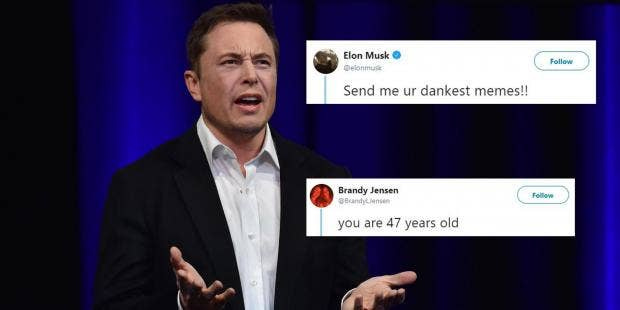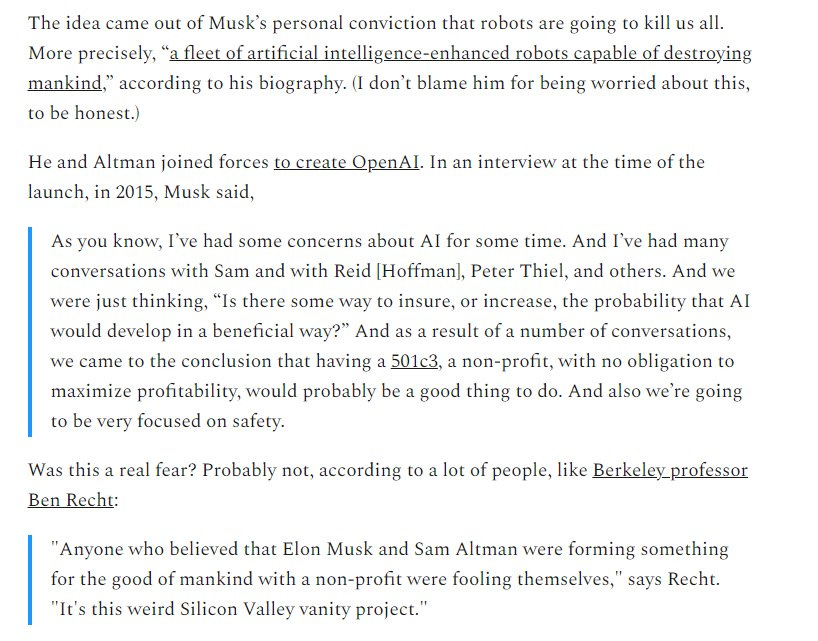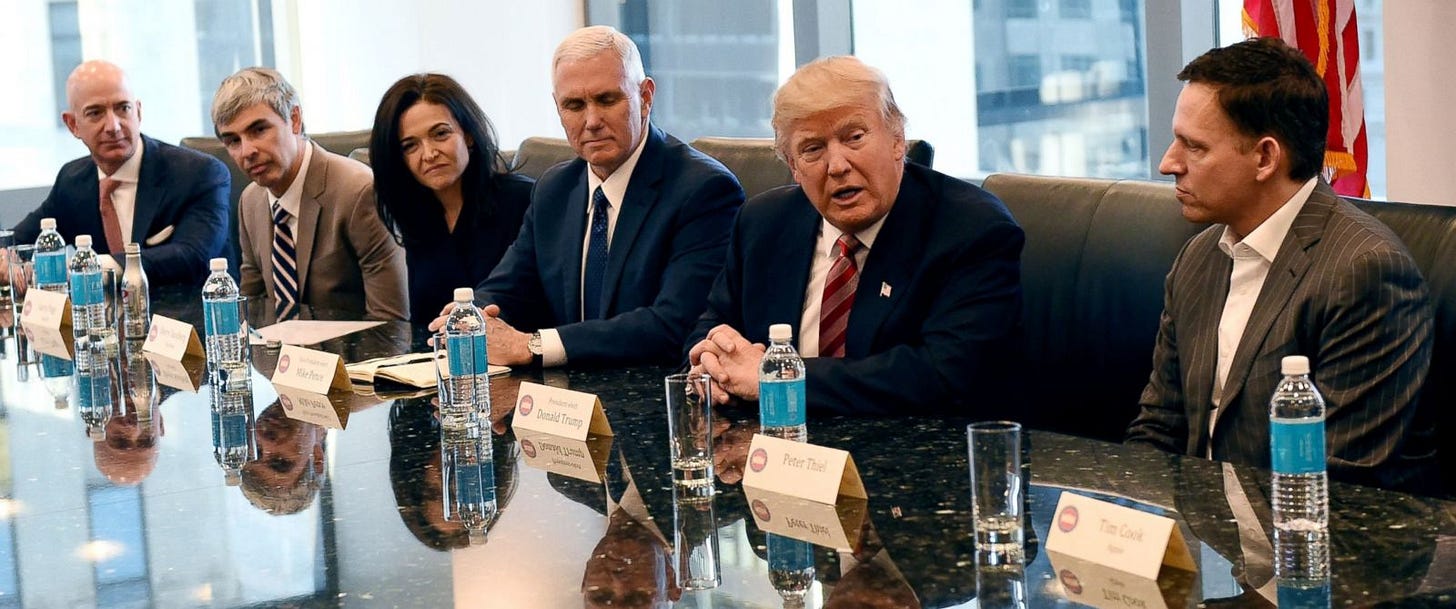Musky Emanations
Elon Musk isn't the disease, but he is the symptom of a looming threat of corporatist ideation all of this everyman propaganda in his creation myth is intending to engender amongst the public
I want to start by stating exactly what is going on here:
The reason the NASA/SpaceX collaboration should be so repellant to everyone is that it changed the relationship between NASA (and the public) and vendors into one that puts NASA at the disposal of SpaceX, to whom they are paying tax dollars. At this point, rather than contracting to have the work done for a civilian space agency (that compensates private industry to produce work ultimately in the public interest), we're using tax dollars to provide government service to a private enterprise for private, ultimately commerical space flight product that will never be available to the public as Elon Musk sets his sights on colonizing space for those wealthy enough to do so.
In the film Elysium, it depicts a future where only the wealthy have colonized space, on an orbiting habitable installation called Elysium, where they have a healthy ecosystem, health care, etc. while the working class lives in squalor on an unhabitable dying Earth; this is, of course, fiction, but the sort of dystopia that becomes plausible when the wealthy are able to consume the labor, without allowing them to benefit from it, because they simply aren’t rich enough to. This is the future we, as tax payers, are allowing Elon Musk to build— in the end, even if this work is made available to NASA, the ability of the public to consume this work eventually will be decades behind the commercial enterprise of Musk’s stated goal of colonizing Mars.
That issue aside, we’re at a level of internal dystopia in the US where Musk’s production operations are being used to politicize a public health crisis, and to make cities compete for the resources this will afford them.
The possible fascistic implications for local governments being subsidized by Musk’s companies are endless, and ultimately, those who believe this is good, either, believes they would remain unimpacted (in which case, I hope their status as temporarily embarrassed billionaires alleviates, and they can join Elon on Mars), or they fell for the grift that is Elon Musk.
I won’t go into his biography, because at this point, if you believe his version of his origin story or not, or the many well-researched biographies that contradict this, then perhaps better things being possible has that same objection to why this is, historically, precedential for fascism. Ultimately, he’s neither qualified, nor equipped to deliver on the promises he’s made with such similar Silicon Valley hacks as Sam Altman:
I bring all of this up to demonstrate that we’ve effectively normalized lionizing people on the far-conservative economic spectrum as somehow enlightened visionaires without real evidence to support the claim that they’re offering anything new; this is all well-tread territory in the US’ political and economic landscape to manufacture consent and consensus for handing over public funds to be capital for private enterprise. In this case, SpaceX has become a defense contractor (Musk, himself, has stated this goal for SpaceX since 2014, but this has been sold to the public as a modern cooperative with NASA).
The influence of corporate leaders like Musk are not without precedent in nations careening towards authoritarianism, and often, because of this civil unrest, the public imbues them with power ordinarily reserved for the state because it seems novel, compared to the predation of the state— an example, aside from Musk, Facebook attempting to dictate monetary policy, for example, when their currency was attempting to be rolled out, had this gained sufficient traction, and you see this again with Palantir, which ostensibly is collecting data for government use, but it persists this data, can and has been alleged to misuse this collected data in contracts with other customers, etc.- while often working in coordination with the state; consider how many high-profile figures in the US government have very friendly corporate donors, and they’re contributing to these lobbies in a bipartisan fashion, this is common with healthcare companies or banks or defense contractors.
A quote attributed to Mussolini (and his ghostwriter, Giovanni Gentile) applied to Italy, but is an effective lens on why this is problematic (even if it’s perceived as a solution to a problem the government is not acting on) globally: “Fascism should more appropriately be called corporatism because it is a merger of state and corporate power.” Consider the implications of the above examples, and how democratic process has already been disrupted domestically by corporate influence, and how, historically, the US has relied on corporate contractors to advance it’s foreign policy agenda (i.e. RAND in Vietnam, mercenaries in Latin American time and time again, Blackwater in Iraq, the list goes on) with deep, deep connections to the state’s most prominent figures. They’re exempt from the usual rules applied to state actors, and if the public can be brought on board, they’re unknowingly cosigning an abuse of power-in-waiting.
Then President-Elect Trump, as a priority, gathered top tech leaders from some of the most egregious exploiters of labor and evaders of their due taxes, to build affinity with these leaders, and it is reminiscient, for example, of the conglomeration of corporate technological establishment of the day with the Axis Powers in World War II (IBM, Siemens, Chrysler, etc.):
Consider what could be done by an authoritarian state with just the private data contained within these figures’ companies. This, of course, didn’t originate with Trump, and in true Trump fashion, he’s simply brazenly doing it in the open, because, well, unlike many establishment figures, he’s entirely self-interested, and since he’s never held office before, he doesn’t have loyalties to lobbyists, so one has to consider what’s in it for him. In the case of Bush and Obama, the surveillance state was mostly and expansion of the apparatus that, for example, the NSA operated prior to 9/11 (one which detected the attackers, and their targets, but not the follow-through to act on it), was used for, supposedly, defense, but was now being turned on the public in the form of companies like Microsoft, Google, Amazon, and shipping services participating in PRISM, to sample and replicate Internet traffic, intercept and modify/compromise network components (so even with physical security modules, etc. the government is very involved in the implementation of these features, but even so, in this scenario, someone running a Cisco router, for example, might have no idea), to aid in this goal.
My point being that there is precedent for example this kind of government-multi-national corporation interplay that, now being inverted for the state to service the corporations, we may be more overtly be moving in that direction and economic views split more extremely, even within the Democratic Party, members are balkanizing, becoming hardline capitalists and privatization as a priority, or calling for socialization to one extent or another.
In historical analysis of revolutionary events, the more extreme the actions of this embedded power, and the reaction of these corporate actors to maximize how far they can stretch from what regulations might normally apply, the more oppositional the response is likely to be. Marx’s main observation was that, if the state will not socialize a necessary resource to fulfill a human right, the failure of capitalism is a communist state; I like to put this differently that the decision by the providing services that fulfill human rights be made, or eventually, that decision gets made for them. Doing this preemptively prevents this disparity from growing, and prevents a situation we find ourselves in right now where billionaires can dictate policy in a way that allows them to act without mandate— changing this is not simply a matter of voting anyway, but organizing. Change doesn’t spontaneously come from legislators out of the goodness of their hearts; the public can make them afraid for their jobs, and thus their access to the influence of billionaires, something our leadership has proven unwilling to foresake without mass demonstration, and this applies to every major social advancement for progressives over the timeline of this nation.
With Musk, he’s testing the waters in real time making a case for unrestrained subjugation of the public’s interest with SpaceX, Tesla, and how it participates in local communities to sow unrest and mistrust of the elected government to bring a following on board with this kind of conduct, and it’s not hard to telegraph back a future prediction to moments like these:
The ongoing protests over the murder of George Floyd is an example of the kind of breaking point that will, eventually, become about more than just police brutality; for example, we’re now working backwards from how the police have become militarized, to what purpose this serves for the military, and why this is is so important in the context of the US foreign policy goal of global imperialist power.
There are a number of disagreeable movements, I think, aside from these protests, that haven’t been successful in the least, because, simply put, reactionaries rarely have the moral and ethical justification for their positions, but usually, they do speak to a desire to combat this corporatism directly; one example is the ecofascist language that has entered the mainstream lexicon through memes, mostly. “Nature is returning, we are the virus” and so on. The premise, on its surface, is understandable; with humans unable to operate in our normal quotidian manner, ecosystems we’ve disrupted have reasserted themselves, emissions are down, etc. All seemingly reasonable things to conclude, but the virus isn’t humanity, it’s consumerism, and specifically driven by capitalism’s corrupting influence on the way humans relate to one another— this, however, normalizes the erasure of the fact that there are many groups of people materially doing no harm, actually improving their ecosystems, on this planet, apart from our marketplaces and consumer practices who are not to blame. Colonialism is a huge reason why this seems ubiquitous, but absolutely is not.
It’s wrong-headed because it seeks to universalize a problem unique to nations like our own who often do put material considerations for the least vulnerable ahead of the impact of producing the goods to satisfy those material conditions; the wealth of SUV owners, the proliferation of factory farms, the culture in manufacturing of normalizing the use of carcinogenic compounds in things we come in contact every day in the form of non-stick cookware, most plastics, and landscaping products that seek to protect aesthetics at the expense of our watersources. With that said, however, it meaningfully seeks to understand how to reverse the damage done to society and our ecosystems by capitalism, which is, frankly, a good starting point, which does not require ending capitalism. I won’t go into the specifics of the policy, but even packages like a Green New Deal are only considered implausible because of their cost, however, we spend $500 million a day on war in Iraq and Afghanistan, billions per year just on air conditioning in Iraq, even some fraction of this could fund these initiatives, to say nothing of universal education, and ending things like employer-tied health insurance (which anyone, whether or not you support single-payer or a Medicare for All policy, is objectively more humane), so it is a very visible struggle between servicing those at the top of our economy, at the expense of those who will be left behind when this exodus for Musk City, Mars begins.
Where we go from here isn’t obvious, but the movement in progress from these protests will, eventually, create some new permanence for the public’s ability to demand more of its leaders; that we’ve rejected half-measures and token conciliatory concessions, suggests that if democratic referendum is no longer possible, the decision to check out of the economy, as we saw a version of beginning with rent strikes, and before that an increased emphasis from leftist organizers on collectivist ideals like community farming, and mutual aid for things like food, protection, education, and housing. We’re living in a different enough world now, mid-Pandemic, that the exposure of these corporate actors could not be clearer, and yet, the divide continues grow between those determined to believe, and those recognizing that the state defending corporate interests over human considerations (a thing that accelerated years ago with the Citizens’ United ruling, for example), absolutely represents a fascist threat in our society, and that change is possible, and that proclivity to change is swiftly becoming normalized.
In the end, in a world where even a month ago, discussion around defunding, let alone abolishing, police and prisons and mainstream discussion of the trickle-down impact of US global imperialism might’ve been unthinkable, but is now being very openly discussed, is it on the table, then, to consider if these corporate leaders very much in-bed with the military/police-industrial complex are as complicit, the question becomes: Is it possible we’re at the threshold for anti-capitalist, and in the context of American pro-corporate capitalism, sentiment to become mainstream in our critiques of public figures being canonized as capitalist strongmen like Elon Musk? One would hope we’re ready for that discussion before this power elite leaves us on a dying planet.
Extras
Recent things I’ve read, listened to, or watched that I am now recommending:
What Mills' "Power Elite" Can Teach Us
Michael Parenti - The Darker Myths of Empire: Heart of Darkness Serie







